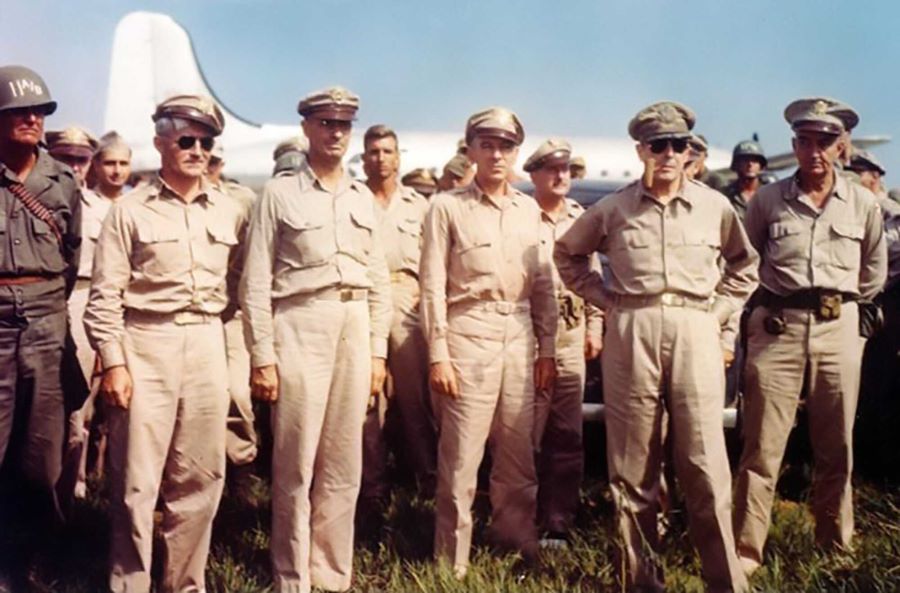Tokyo War Crimes Trial (1946-1948)
Tokyo World War II War Crimes Trial by Douglas O. Linder

General Douglas MacArthur (with corncob pipe) near Tokyo on August 30, 1945
The judges called it the “biggest trial in the world” and in many ways it was. The 1946 to 1948 trial of 25 Japanese political and military leaders for their actions during World War II covered many of the most gruesome or bloody events in the Pacific Theatre: the Bataan “Death March” of American and Filipino prisoners of war; rape and massacre in occupied Nanjing, China (as many as 20,000 rapes in the first month alone); the forced construction of the Burma to Thailand railway during which thousands of Australian and Asian prisoners died; the surprise bombing of Pearl Harbor. The aim of the Tokyo trial, like its counterpart in Nuremberg, was to establish a regime of international law that would make a safer world. The trial was big, but also unwieldy and with unexpected turns. Whether it achieved its grand ambitions is at best debatable. But the trial surely revealed, as no other event could, the complicated tensions of postwar Asia.
The War Ends. What Next?
But for Secretary of War Henry Stimson, there probably would have been no international war crimes tribunals in either Nuremberg or Tokyo. The American public (90% of it) favored swift punishment of Japanese warlords, but only 4% believed the Japanese war leaders deserved anything like a fair trial. Before his death in April 1945, President Franklin Roosevelt, as well as his influential Cabinet members, including Treasury Secretary Henry Morgenthau and Secretary Cordell Hull, also thought quick executions were the answer. President Harry Truman, on the other hand, was much more open to Stimson’s argument that trials, rather than summary executions, would teach needed stern lessons to the people of Axis countries about what Truman called the “crimes of the gangsters they placed in power.” Truman wrote about Nuremberg, “I believe the effect will be very great on future was—at least I hope it will prevent them.”
After Hitler’s fall in Germany, surrender by the Japanese Empire seemed only a matter of time, but in that time hundreds of thousands of lives would be lost. Truman was determined to minimize the number of lost American lives in that final count. That meant avoiding a land invasion of Japan.
On July 16, 1945, Truman learned of the successful test of an atomic bomb in New Mexico. According to Secretary Stimson, Truman was “highly delighted.” Meanwhile, Emperor Hirohito had called an imperial conference in which he pressed the nation’s military leaders to find a way to halt the fighting, which had cost the lives of 1.5 million Japanese in the last year alone.
On July 25, Truman noted in his diary that he would use the atomic bomb against Japan “between now and August 10th.” Among Truman’s top advisors, only General Eisenhower expressed “grave misgivings” about using such a terrible weapon that would cause mass civilian casualties. On July 26, Allies issued their Potsdam Declaration offering Japan one last chance to surrender or face “the inevitable and complete destruction of the Japanese armed forces and just as inevitably the devastation of the Japanese homeland.” The Declaration also stated that “stern justice will be meted out to all war criminals.”
At 8:15 a.m. on August 6, a brilliant yellow-orange flash of light appeared above Hiroshima. Truman learned of the blast aboard a cruiser in the Atlantic. He told the ship’s crew, “This is the greatest thing in history.” Japan formally protested the use of the atomic bomb, calling it an “inhuman weapon” deployed in “defiance of the essential principles of humanitarian laws.” In private, Truman said he used the bomb because he felt it “absolutely necessary” to save American lives, but that “I certainly regret the necessity of wiping out whole populations because of the pigheadedness of leaders of a nation.”
On the night of August 9, the same day that a second atomic bomb dropped on Nagasaki, Japanese leaders met in an air raid shelter at the Imperial Palace. Foreign Minister Togo Shigenori urged that Japan surrender under the terms of the Potsdam Declaration with a stipulation that it would not prejudice the status of the emperor. Maintaining the monarchy, he and most others agreed, was essential to avoiding anarchy or a leftist revolution. Army ministers urged that the nation fight on, even if millions more must die. After hours of debate, the foreign minister asked Emperor Hirohito for his decision. Wiping away tears, Hirohito said that they must “bear the unbearable”: Japan would surrender. . . . Continued
